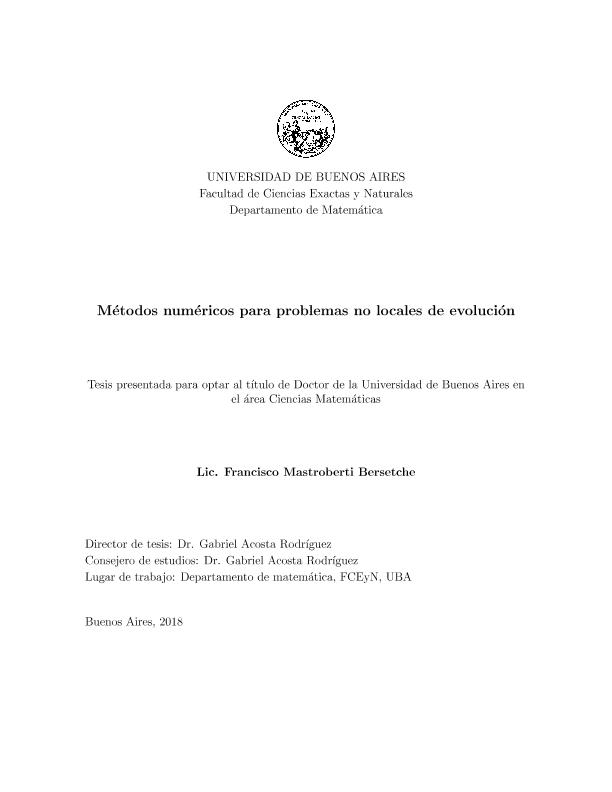Mostrar el registro sencillo del ítem
dc.contributor
Acosta Rodriguez, Gabriel

dc.contributor.author
Mastroberti Bersetche, Francisco Vicente

dc.date.available
2019-07-23T20:20:16Z
dc.date.issued
2019-03-06
dc.identifier.citation
Mastroberti Bersetche, Francisco Vicente; Acosta Rodriguez, Gabriel; Métodos numéricos para problemas no locales de evolución; 6-3-2019
dc.identifier.uri
http://hdl.handle.net/11336/80087
dc.description.abstract
This work introduces and analyzes a finite element scheme forevolution problems involving fractional-in-time and in-space differentiation operators up to order two. The left-sided fractional-order derivative in time weconsider is employed to represent memory effects, while a nonlocal differentiation operator in space accounts for long-range dispersion processes. We discusswell-posedness and obtain regularity estimates for the evolution problems under consideration. The discrete scheme we develop is based on piecewise linearelements for the space variable and a convolution quadrature for the time component. We illustrate the method?s performance with numerical experimentsin one- and two-dimensional domains.
dc.description.abstract
The aim of this work is to study numerical approximations for evolution problems of the form C ∂ α t u + (−∆)su = f in Ω × (0, T), where (−∆)s stands for the fractional Laplacian operator in its integral form and C ∂ α t u(x, t) represents the Caputo derivative. To be more precise, (−∆)su(x) = C(n, s) p.v. ˆ Rn u(x) − u(y) |x − y| n+2s dy, and C ∂ α t u(x, t) = ( 1 Γ(k−α) ´ t 0 1 (t−r)α−k+1 ∂ ku ∂rk (x, r) dr if k − 1 < α < k, k ∈ N, ∂ ku ∂tk u(x, t) if α = k ∈ N. We deal with existence, uniqueness and regularity of solutions in the linear context (i.e. f = f(x, t)). The cases under study include fractional counterparts of the standard diffusion and wave models. Linear finite elements are used for the spatial variable and convolution quadrature techniques for handling the time fractional operator. Error bounds, uniform in the discretization parameters for values of t away from zero, are given. These results are extended to the semi-linear case with f(u) = u − u 3 appearing in the classical Allen-Cahn equations modeling phase separation for binary alloys. Additionally, the asymptotic behaviour of the solutions for s → 0 is studied in this particular context. Implementation details, particularly for the finite element method involving full fractional stiffness matrices and numerical quadratures for singular kernels, are carefully documented
dc.format
application/pdf
dc.language.iso
eng
dc.rights
info:eu-repo/semantics/openAccess
dc.rights.uri
https://creativecommons.org/licenses/by-nc-sa/2.5/ar/
dc.subject
Laplaciano Fraccionario
dc.subject
Derivada de Caputo
dc.subject
Método de Elementos Finitos
dc.subject.classification
Matemática Aplicada

dc.subject.classification
Matemáticas

dc.subject.classification
CIENCIAS NATURALES Y EXACTAS

dc.title
Métodos numéricos para problemas no locales de evolución
dc.title
Numerical methods for non-local evolution problems
dc.type
info:eu-repo/semantics/doctoralThesis
dc.type
info:eu-repo/semantics/publishedVersion
dc.type
info:ar-repo/semantics/tesis doctoral
dc.date.updated
2019-06-28T14:56:39Z
dc.description.fil
Fil: Mastroberti Bersetche, Francisco Vicente. Consejo Nacional de Investigaciones Científicas y Técnicas. Oficina de Coordinación Administrativa Ciudad Universitaria. Instituto de Investigaciones Matemáticas "Luis A. Santaló". Universidad de Buenos Aires. Facultad de Ciencias Exactas y Naturales. Instituto de Investigaciones Matemáticas "Luis A. Santaló"; Argentina. Universidad de Buenos Aires. Facultad de Ciencias Exactas y Naturales. Departamento de Matemática; Argentina
dc.relation.alternativeid
info:eu-repo/semantics/altIdentifier/url/http://cms.dm.uba.ar/academico/carreras/doctorado/Tesis%20mastroberti.pdf
dc.conicet.grado
Universitario de posgrado/doctorado

dc.conicet.titulo
Doctor en Ciencias Matemáticas
dc.conicet.rol
Autor

dc.conicet.rol
Director

dc.conicet.otorgante
Universidad de Buenos Aires. Facultad de Ciencias Exactas y Naturales. Departamento de Matemática

Archivos asociados
